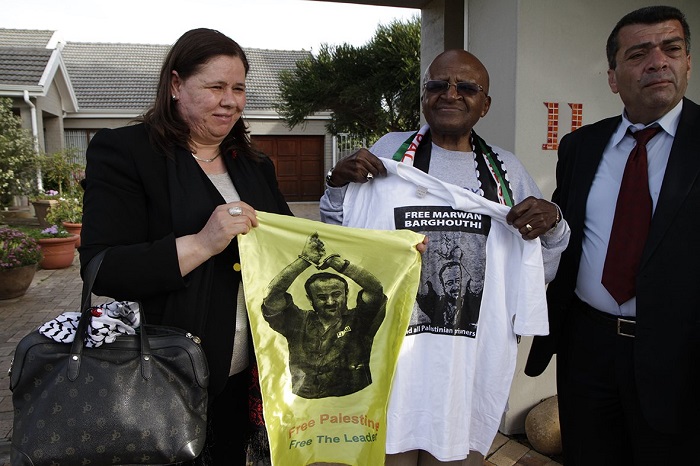Coinciding with annual Palestinian Prisoners Day, commemorated on 17 April, some 1500 Palestinians are today embarking on a mass hunger strike. As one of the largest hunger strikes in recent years, the strike led by Fatah leader Marwan Barghouti will see Palestinian prisoners from across the political spectrum participate from within six Israeli prisons. The prisoners are calling attention to the lack of basic rights and the humanitarian conditions inside Israeli detention centres.
As of April 2017, 6300 Palestinian political prisoners are held in Israeli detention centres, including 500 administrative detainees, 300 children prisoners, and 56 females’ prisoners. While over 1000 require medical care.
Barghouti in his call for the hunger strike spoke of the degrading treatment that Palestinian political prisoners are forced to endure at the hands of Israeli authorities, with some 200 Palestinian prisoners dying since 1967 due to the conditions.
“I was barely 18 when an Israeli interrogator forced me to spread my legs while I stood naked in the interrogation room, before hitting my genitals. I passed out from the pain, and the resulting fall left an everlasting scar on my forehead. The interrogator mocked me afterward, saying that I would never procreate because people like me give birth only to terrorists and murderers.”
Having spent 15 years as a Palestinian political prisoner, he drew parallels between the struggle for Palestinian self-determination and the plight of South African struggle veterans who fought against the Apartheid system.
“Israel is not the first occupying or colonial power to resort to such expedients. Every national liberation movement in history can recall similar practices. This is why so many people who have fought against oppression, colonialism and apartheid stand with us.”
The strike is, therefore, aimed at ending the inhuman and degrading treatment of Palestinian political prisoners.
Demands of the Strikers
1) Installation of a public telephone in each prison and section for Palestinian prisoners to communicate with their loved ones.
2) Family Visits
- A) Resume the second monthly visit, which was cut by the International Committee of the Red Cross
B) Regular visits every two weeks without cancellation or interference
C) No prevention of visits by relatives of the “first and second class”
D) Increase the duration of visits from 45 minutes to 1 1/2 hours
E) Allow photography with parents every three months
F) Facilities for the comfort of prisoners’ parents at the prison entrance
G) Children and grandchildren under the age of 16 allowed visitation at each visit
3) Medical Care
- A) Close the so-called “Ramle prison hospital,” as it is unfit for necessary treatment
B) End of the policy of medical neglect against prisoners
C) Regular, scheduled periodic medical examinations
D) Surgical procedures received quickly and without delay
E) Introduction of specialist doctors from outside the prison system
F) Release of sick prisoners, especially those with disabilities and terminal illnesses
G) No transfer of the cost of treatment to prisoners and their families
4) Respond to the needs and demands of the Palestinian women prisoners for private transportation and direct visits with their family members without barriers
5) “Bosta” and Transportation
- A) Secure the humane treatment of prisoners during transportation and movement
B) Prisoners must be returned to prisons, clinics and courts and not kept at crossing points for lengthy periods.
C) Rehabilitation of these crossing points to make them fit for human use, including providing meals
6) Access to satellite channels tailored to the needs of prisoners
7) Installation of a cooling system in prisons, especially Megiddo and Gilboa
8) Reform kitchens for all prisons and put them entirely under the supervision of Palestinian prisoners
9) Introduction of books, newspapers, clothing, food and other gifts for prisoners from their families during visits
10) Ending the policy of solitary confinement
11) Ending the policy of administrative detention
12) Re-introducing access to education via the Open Hebrew University
13) Allow the prisoners to provide high school (tawjihi) examinations under officially agreed-upon guidelines
VOC 91.3fm






 WhatsApp us
WhatsApp us 

